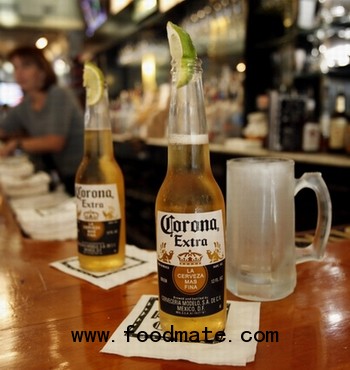
Antitrust regulators from the Justice Department in recent weeks have been quizzing beer distributors and craft brewers about the competitive implications of the $20 billion deal, which would give beer behemoth A-B InBev ownership of the nation's most popular import label: Corona. They've started to hear from U.S. senators concerned about the deal, too.
Then on Tuesday, a Washington, D.C., antitrust trade publication reported that the Justice Department was putting some of its top lawyers on the case, and appeared “unlikely” to let the deal go through as currently structured.
None of the principals involved would discuss the situation. A DOJ spokeswoman declined comment. A-B InBev said only that they still expect the deal to close in early 2013. But industry-watchers say the moves suggest that the Justice Department plans to push for significant changes. A-B InBev's share price slid late Tuesday and Wednesday after the news broke.
It's far from clear what the Justice Department might do, but antitrust concerns have swirled around the buyout since it first came to light in June.
InBev already sells nearly half the beer in the U.S. And it was forced to sell off U.S. rights for its Canadian brew Labatt when it bought A-B in 2008, over concerns it would have too much market share in upstate New York. Adding Corona to A-B's stable would give the brewer a commanding presence in big states like Texas and Florida, with the potential to raise prices and squeeze other players.
To ease those worries, A-B InBev reached a side deal with Constellation Brands, which would import Modelo products to the U.S., essentially putting an extra buffer between A-B and Corona.
“We believe this transaction brings no change to the U.S. market,” A-B InBev Chief Executive Carlos Brito told analysts when the deal was announced June 29.
But it appears antitrust regulators may not see it that way.
A report in The Capitol Forum, a newsletter written by former Beltway antitrust lawyers, said this week that the Justice Department's antitrust division has put some of its top staffers on the case, brought in economists to review A-B InBev's plan and is gearing up for a fight.
"The situation is an 'all hands on deck' matter," they quote a former DOJ litigator as saying.
Under President Obama, Justice officials have taken more aggressive stance toward mergers – especially ones involving rivals in highly concentrated industries – and has won some big victories, including blocking AT&T's proposed $39 billion takeover of T-Mobile last year.
Now they're looking for another big case, antitrust watchers say. And they're apparently getting an earful from the beer industry over Bud and Modelo.
“A number of distributors” have talked with Justice Department officials about the deal, according to a spokesman for the National Beer Wholesalers Association. The deal could be a point of leverage in the quiet but growing scrum between big brewers and their wholesalers over consolidation of the nation's Prohibition-era distribution system. A-B InBev in particular sees the potential for big profits from its wholesale network, but those profits would come out of the hides of its 600-plus independent distributors. Gumming up a $20 billion merger could be one way to push back.
“NBWA is committed to ensuring that the independence of beer distributors is maintained, not weakened, as a result of this proposed acquisition,” the trade group said in a statement.
Small brewers are getting the ear of the Justice Department, too.
Bob Pease, chief operating officer of the Brewers Association, which represents independent brewers, said his group has been contacted by regulators to weigh in on the case. They've also hired Jones Day, a high-powered Washington law firm, to represent them in the matter.
“The BA does have concerns about the merger on behalf of all small American breweries,” Pease said.
Chief among those concerns is shelf space. An A-B/Modelo tie-up, with a growing portfolio of A-B-owned craft beers like Goose Island and a tighter rein on distributors, could crowd smaller independent brews off the shelf, said Dan Kopman, co-founder of Schlafly parent The St. Louis Brewing Co. That, he said, would hurt consumers.
“It's really up to the consumer to decide what they want to buy,” Kopman said. “But if a consumer goes into a bar or grocery store and beers from independent brewers are not available, then the consumer can't decide. I would say that's a distortion of the market.”
That argument has some allies on Capitol Hill. Five senators - none from Missouri or Illinois - sent a letter last week to Attorney General Eric Holder echoing some of craft brewers' concerns, and urging a close look at the deal.
"We hope that you will endeavor to protect the public interest in maintaining an open, accessible and diverse market," they wrote.
Still it's unclear what, if anything, DOJ might do to change the dynamic.
They have options beyond a simple “Yes” or “No.” Negotiations will likely go on behind the scenes, and, to win regulators' blessing, A-B InBev could agree to change its contract terms with Constellation – like dropping an option to buy back distribution rights in 10 years – or to sell off other brands to reduce market share.
Even if that happens, wrote Stifel beer industry analyst Mark Schwartzberg, it's unlikely to dampen A-B InBev's enthusiasm for winning full control of Corona, a brand they plan to promote worldwide alongside Budweiser and Stella Artois.
“The final transactions may well differ from the planned transactions,” he wrote in a research note. “But we would be surprised by modifications that materially alter their fundamental appeal.”
The presidential election also could render the merger objections moot. New leadership under a Romney administration make take a different tack. Even under an Obama second term, the Justice Department may simply decide not to press the case. Sometimes, even dark clouds just blow away.





